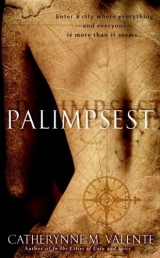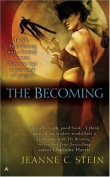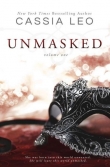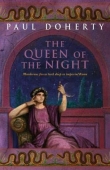
Текст книги "Palimpsest"
Автор книги: Catherynne M. Valente
Жанр:
Классическое фэнтези
сообщить о нарушении
Текущая страница: 11 (всего у книги 19 страниц)
Sei would never want to drink, or dance, only to grip them between her thighs and then sleep like a dead thing. She would become naked and raw and without guile; she would seek as truly as a knight.
Sei could see it all so clearly, a path through the woods: touch no one who does not carry the map—she and Yumiko would certainly agree between themselves that this was wrong, risky, that the secret was theirs and those of their tribe, and not to be squandered.
But perhaps once, after the snow melts, Sei thought she could imagine a version of herself that would make an exception for a young man with cedar-colored skin and a nose ring like a bull’s, or a minotaur’s. No one special. Someone who came to the club and was, of course, turned away. By then he would seem so alien and strange to Sei, so blank and empty. Pristine. Possessed of purity.
Sei knew her weaknesses—she would plead with Yumiko: I am weak. Sometimes it is still about love, and need.
When she wakes with him, in that not-very-distant future, that Sei watched blankly in the reflection of a brass plaque, the grid will brachiate out from his footpad, its angles dark and bright, and she will envy him, for wherever he walks now he walks in Palimpsest, and it will be all new for him, all new. Before he stirs, she will leave his house without tea or farewell.
Standing before the door to the Floor of Heaven, the train hurtled so fast into the future. She could hardly bear the speed, the inevitable, unavoidable sequence of stops and passengers, the toll, never to be paid in full. Tears pricked behind her eyes.
It all stood in front of her, behind a black featureless door, ready to swallow her whole.
“Yes,” Sei said. “I’m ready.”
Inamorata
INAMORATA STREET ENDSin silver sand and a great craggy finger of stone, stretching out into the sea. The glittering water flows out to the horizon and over it, a great dark expanse, whitecaps glistening in the moonlight. Foam shatters into seaglass on the beach, and couples walk arm in arm along a strand of shards, glittering and wet. Striped tents dot the beach head: red and yellow, green and white, rose and powdery blue. Women change into bathing uniforms with flared waists and broad hats to keep out the moonlight; tuba players march back and forth, blaring out nocturnes.
The infirm of Palimpsest come here to recover, to collect seaglass on their bedside tables and write novels on the nature of the solitary soul. Mustached men sell bottles of seawater in the inland markets for the price of kingdoms, and false phials abound. The air blows fresh and sweet; it smells of tangerines and salt and white sage, and charlatans bottle this too and sell the empty glasses to immigrants for the price of a parliament seat.
Each evening the hopelessly ill are brought in gauzy palanquins to view the moonrise, and all applaud the appearance of its white disc over the water. The wind is considered to have such restorative power that surgery is performed on the beach, anesthesia administered by waifish women with hair like spun sugar, who close their mouths over the ailing and breathe the vapors of their crystalline hearts into weakened lungs.
Ermenegilde has been a patient here since the war ended. She is a charity case; her reassignment went poorly and she was rendered useless for the field. She has bled from her wounds every day for twelve years. Bluebells drape her palanquin: the veteran-flower. Medical gauze swathes her face in long bridal veils. All agree that if not for her mouth, she would be now a great dowager-beauty. But there is her mouth, it remains, and cannot be denied.
Once, in a field hospital set up for such amputations, surgeons removed her jaw, her teeth and the better part of her nose. In its place, they inexpertly sewed a panther’s muzzle. The practice was new then, though it was to become the single great symbol of the war—there were no experts in those days. Ermenegilde’s graft did not take, it would not heal, and stitches are still required to keep her two faces joined together. The wiry knots are black with blood. And though her new teeth are sharp and vicious, as they were intended to be, though her whiskers can detect the smallest drop in barometric pressure, she suffers infections and fevers.
And of course, of course she cannot speak. None of them can.
Ermenegilde is always the first to be carried to the shore for moonrise. She took up photography many years past, and her nurses help her each evening to set her daguerreotype in place so that she may print her plates of the great full face she still hopes will mend her. She breathes deep, and prays the moon will hold still for her portrait. Ermenegilde knows, however, that it is difficult to do, and does not blame the heavenly body for her restlessness. She, too, has had to sit for pamphleteers and medical historians alike. She is possessed, after all these years, of immense empathy.
_______
November cradles her left hand gingerly in her right. She does not want to think about it, not now, that morning three days past when she had woken up with that poor girl’s pale hair covered in blood and her own fingers gone. Her blessing fingers. It’s almost funny. There was no wound, the stumps as smooth and tan as if some hand had simply plucked off her fingers like fruit. But there was blood, blood everywhere, though it came from nowhere, and they had scrubbed and scrubbed to get it clean.
But Casimira was right. Things are clearer now. There would be no more of this “it’s only a dream” business. What happens here happens there. November is not a slow student. In her way she appreciates the act. It’s like cheating on a test—so much easier when you have the answers written on your hand.
“My house misses you,” comes Casimira’s brandywine voice beside her.
November turns, and the green-haired woman is there, her curls loose to the backs of her knees, in a bathing dress that reveals no skin at all, billowing and green. November puts her hand over the place in Aloysius’s dress where her own belly shows through. “He weeps dust all night long and has turned all the calendars to fall. It is extremely tiresome. If you do not visit I shall have no peace at all.”
“How did you know I would be here?”
“When will you learn that if a fly, if a bee, if the smallest worm witnesses a thing, I witness it also? I have tried so hard to explain matters clearly. Will it take another finger to impress this upon you?”
“No,” says November hurriedly.
“If the fingers are a very great loss, I can arrange for replacements here. In that, you are lucky to have come to this place above others. The sea is so good for one’s health. Also the surgeons gather here to beg for work. The debauched and the desperate are always drawn to water, is that not strange?”
Casimira kisses November’s broken hand like a mother kissing her child’s ills away. “I can purchase a whole paw, I think, though they are not very dexterous. Tiger, perhaps, or lion? Cougar? Or maybe just the fingers, in which case it will have to be an ape of some flavor. Please do not think of the cost.”
“What about human?”
Casimira laughs. “Don’t worry, they’re quite skilled at it by now. War is such a marvelous instructor.”
“If the options are ape or cat, I think I’ll have to decline.”
“No fun at all.” Casimira smirks.
_______
The two women stride arm in arm along the beach. Casimira shoos away the beggar-surgeons with her umbrella, and saves a piece of seaglass for November to keep on a bedside table, should she ever acquire one. They talk about the air and the water, and how November’s father might have benefited, in the days when he vomited blood and had to be carried to his tiny downstairs bathroom to do it.
“We do not exist, however sad your father’s case may have been,” Casimira says primly, “for the benefit of all.”
November does not want to discuss it, not really. She knows her place in the universe, knows its label, and none of it can help her father now. There are mushrooms in his skull, and that is all.
“What is wrong with them?” she asks instead. “The ones on the long beds, the woman with the muzzle sewn onto her face.”
“There was a war. I told you that. It was not a very long time ago, not very long at all. I was a child when it began.”
“What happened?”
Casimira’s mouth curls into a feline grin. She looks up, sidelong, at November. “I won, is that not apparent?”
November starts, a lock of faded brown hair pulling free of her knot. “What, you against everyone?”
“Not quite so simple, no, but it ended that way, certainly.” Casimira turns sharply to November, and though she is quite short, manages to look precisely like a stern schoolteacher. “List for me, November, the reasons one may start a war.”
November blushes, frightened, unwilling to speak her lists aloud, into the sea, into the surf. Not when ordered to. They aren’t soldiers, they don’t come when called. They’re private, they’re hers, Casimira has everything in the world. She can’t have them, too.
“Now,” the matriarch orders, “or it’s orangutan fingers for you.” Nearby, a bent old man in a white laboratory coat shoots them a hungry glance.
“Religion,” November whispers, her stomach knotted, her heart seizing itself in shame, as though she had just opened her dress and shown herself naked to the matriarch of Palimpsest. “Territory. Vengeance, historical enmity, alliances.” She starts to hitch and sob, losing her list to the air, to the wind and the sea, lost to her notebooks, to herself. “Resources—food, fuel, water, labor, expansionist government, I don’t know . . . I’m sorry, I can’t think . . .”
November’s face burns. She wants to cry again but will not allow it. She will not humiliate herself, and she is sure she has not hit upon the cause Casimira wants to hear.
“Can war, do you think, be a tool of policy?” she says with a gentle didacticism, as their walk takes them around a bend in the surf that throws up glimmering, half-translucent urchin shells onto the beach.
“I don’t . . . I’m a beekeeper . . . you can start a war however you like . . .”
“Well, thank you, but, in your opinion.”
“Of course . . .”
Casimira looks November up and down, her dark eyes glittering with amusement. “Immigration policy, perhaps?”
November wrings her hands, closing her right hand over the place where her left fingers have been. She is still not used to the wretched stumps and recoils from herself as though burned.
“Casimira, I don’t know!”
The older woman’s face softens and she stops, taking November’s cheeks into her hands. “Am I being very dreadful to you? It is hard for me to remember, sometimes, that others live alone, and do not have a billion children to whom lullabies simply mustbe sung. Come, let us get you a drink, it will do you good. And then we must go home, for my house is threatening to tear down the haberdashery next door if I do not bring you as soon as I am able.”
As they walk toward a gleaming black pier, something like obsidian strung with white lanterns, folk they pass, ill and well, shrink back from Casimira, cross themselves or sink to their knees in reverence. One or two doctors spit at her. She holds her head high, until the spit splatters on the hem of her bathing dress. She casually flicks her fingers in the direction from which it had come, a gesture like removing dust from a collar. Three wasps fly from her sleeve with a high, rageful, indignant screech, and defend their mistress with keen stingers of brass. The doctors fall to the shore, their arms raised over their heads.
On the black pier, Casimira takes a great wooden pitcher from a wire rack and dips it into the sea. She offers it to November, who still trembles and rubs her elbows. She drinks; it tastes of tangerines, and salt, and white sage. It tastes nothing like the sea she knows, nothing like her Pacific with its long gray arms—it is sweeter, and thicker. The midnight tide crashes diamond wave against stony shore, sending spray into the thready silver clouds that collar the moon.
Did I ever think San Francisco was beautiful?marvels November. I was a fool.
_______
“We must take a circuitous route.” Casimira sighs. “You are too new to have forged any reasonable path through the city.”
“I’m sorry, I tried . . . you know, on the other side, there are people who try to keep you from finding too many people.”
Casimira snorts. “There are people like that here, too, I assure you. But of course you tried, my dear. One cannot really be so fortunate as to choose adjacent lovers. No one blames you.”
An emerald carriage rolls onto the sand, spraying white granules, and opens a silent, solicitous door. November all but collapses into it. She lays her head in Casimira’s lap, exhausted. She has grown too big for herself, that is all. Terrible things occur when you outgrow the space allotted to you. You cannot really circumnavigate Fairyland like September did, not really. It’s too big for you.
A few forlorn bees crawl over her hands, their tiny clockwork wings whirring. November gives them a halfhearted smile and strokes them gently.
“I have three secrets I want to give to you, November. Like in a fairy story. They are very big things, and I have had them wrapped specially. But you must be good for me, if you want it. Do you understand?”
Suddenly she is alert. Three gifts—that is something. She knows how to behave, if this is the sort of story where an imperious woman offers her three gifts. “Yes,” November says, sitting up straight. Casimira pats her head.
“Good girl. My bees want a thing from you, and I would like to ask you to give them what they crave. It is not mine to give.”
“Aren’t we going to your house?”
Casimira laughs like a glissando of bells. “You have caused such a commotion in my districts! Everyone bawls and throws tantrums for you. You are the star of all their fever-dreams. I suppose all mothers must prepare for the day when their children fall in love and no longer need her, but it pierces me so! My heart is not so efficient as theirs! We are going to the factory, my love. Then home, where your present awaits, if you are a good girl and a pliable one.”
“ I will stand upon my raft until the Green Wind comes for me,” November says gravely. “ My dress; my sail.”
“That’s lovely. Scripture?”
“Yes,” November answers with fervency: clasped hands, wet eyes. “Hortense Weckweet.”
“How marvelous! Her daughter Lydia was such a fine sculptor.”
November gapes as the carriage clatters on, and Casimira offers nothing more.
_______
The factory is a mass of green-white spires, and the song of the shift change spills from it as though they are the pipes of a church organ. Casimira strides boldly through the front gate: it is her place, nowhere is her power so piquant as here. In a mother-of-pearl lockerroom where the third watch has left their helmets, she changes into no more than a wage-slave’s dress: white and green scales, laid one over the other, little pearly discs glittering in the spirelight. She provides one for November, and it is not very unlike being naked: every curve and wrinkle is visible, and the scent of the scales is like crushed mint stalks.
They ascend past great vats and printing presses so old the wood-worms in them have written three full encyclopediae of the contents of their empire. The whirr and buzz of insects fills every inch of air, but also the chirruping of squirrels and heated mating of rabbits newly molded. Mice learn from a great machine how to wash their whiskers, and as Casimira passes, they scream a hymn of joy to her name. But the bees are kept high, high in the towers, and still they climb.
“My grandmother built this place,” Casimira says, her voice neither quickened nor stuttered by the endless stairs. “Not really my grandmother, of course, but the number of greats involved is so many it is considered impolite to use the actual number. Outside the family, she is a legend of legends—impossible that she truly lived! Preposterous! Yet still. She is the blood of my blood of my blood, and I know her sorrows like my own bones.”
The stairs become steep—November is winded, panting, but Casimira continues as though they are strolling across a meadow. “She dreamed of a butterfly once, and upon waking was seized with grief that she could not possess it. On three hundred subsequent nights she dreamed of vermin, of cockroaches with shells that shimmered in her heart, of grasshoppers and mantises and centipedes, beetles and mosquitoes and wood lice like tiny pearls. Starlings and ravens flapped darkling in her mind, and chipmunks with livid stripes like war-paint. She was tortured with these visions of beauty, and her family could not heal her, though she was taken to just the seashore where you drank the brine, and she drank, too, but was not calmed. She dug the foundations of this building with her hands, clawed the soil to her will. I am a great admirer of my grandmother. I, too, have my claws. I, too, have my soil. Little must be said of my will. But the day that the first fly opened its wings in her hand, the first worm nosed blindly at her cheek—she knew such sharp and secret satisfactions on that day! I know them now, yes, I know them, I know them as old friends and lovers, but time dims all things. Here.”
They duck into a great room, further up the spires than November would have thought bees would prefer. The chamber is all of wax the color of fine butter, arching like a cathedral dome, hexagonal holes yawning black and thrumming, and more bees than November could have imagined swarm over it, excited, palpitating, expectant. Casimira spins slowly in the center of the room, her eyes shut, her emerald hair coiling around her like seaweed. She reaches out her hands to November as though inviting her to a stately dance, and under a million black-bellied bees, November shyly steps into the strange woman’s arms.
“Do you know why it is that I have done so much for you?”
Casimira says fiercely, drawing November too close, too tight. “You would agree that I have done much, and promised more?”
“Y . . . yes.” November’s stomach turns over. She begins to think that Casimira was never taught the word “no.” The matriarch is beautiful, and terrible, and she takes everything in the world for her own. November has been taken, she knows this, and one does not argue with the one who takes. No one whose father was a librarian is ignorant of their Greek myth: when Hades hauls you into his chariot, you do not argue that he has been rude not to ask if you really wanted to go.
“It is because you are my proof,” Casimira breathes. “You are proof of all I have done, all I have done in service of my city. Proof of my rectitude, of my virtue. You stand in my halls and I know that I was right, I was not a fiend that tore into my home as though . . . well, as though I had the mouth of a lion. I am a creature of complex geometries, General of Grotesqueries, Princess of Parallelograms. But I am not a queen, and never shall be. No matter what they say I did not want to be. I have committed my crimes, and horrors have flown from me into the world, but you look at me in your blue dress, in Aloysius’s dress, and in your innocence say: Casimira, all is forgiven, for I am here.My bees scream: Casimira, all is forgiven, for she is here.”
“What do you want from me now, Casimira? There are . . .” November’s lip trembles, her eyelids slide shut in a half-swoon. She does not want to do this, but she feels she must give something in return for the seawater, and the dress, and this golden room. “There . . . there are . . . nine sorts of people . . .” She swallows hard, marshaling her nouns into columns, her heart into steadiness. “There are nine sorts of people deserving of absolution: wives, saints, children, adulterers, debtors, students, those thwarted in love, melancholics, and those seized by occasional angers.” This is my gift to you,November thinks, as loudly as she can, I have wrapped it specially, a list, for you and only you.“Nowhere are there listed beekeepers or generals. We find comfort only in each other. There is no grace waiting at the end of a long journey, not for us. Tell me what you want from me.”
Casimira sniffs slightly, her eyes reflected crystalline in a rim of hard tears. “I thought you would have guessed it. They want you, they want you as their own, forever. They have not made a queen in all their lives, they have no jelly, being all wire and glass and infinitesimal engines. I have always been enough. Perhaps this is my punishment. It is certainly keen. Secret, and sharp. But I am willing to give them what they want. A mother must be willing.”
November shakes her head, laughs a little, ruefully. “What will that mean?”
“I don’t know, exactly. They won’t tell me.” Casimira frowns. “I am . . . jealous. Yes. I am jealous. But it is all right.”
An arrow of aspic life tears from one of the combs and arcs toward them, landing before November in the shape of her bee-manikin, her suitor of the second night, the night of her dress and the memorial on Seraphim Street. It bows to her, and when it rises its buzzing hands are full of golden liquid. It holds out its palms to her, imploring, beseeching.
“I thought they hadn’t any jelly.”
“I made it for them, as I make all things in this palace of industry. How could I do else? I clawed the soil to my will. In a vat of red clay I stirred so many of their poor bodies, golden oils to lubricate the invisible gears of their hearts, their honey, which is a secretion under the thorax and has a peculiar flavor of pine pitch, and my own blood, which is all of a queen they have known. It is their first jelly, and they are very proud of it.”
The manikin opens its mouth as if to speak, and the buzz that issues from it is like a strangling. November rushes to it as to a crying child and hushes it, crooning in her way, the way she has always used to calm her bees, and though she has no flowers for them, no heather or heartsease, no basil or orange, she supposes she is enough, and if you put enough bees together they become more than bees, just as nouns become more than nouns, and she cannot turn that away.
My dress; my sail.
“This is not, of course, your present,” says Casimira casually.
November hushes the manikin, strokes its buzzing forelock gently. “Oh . . . I thought—”
“Yes, well, being a queen may sound nice, but it is not much of a present in the end. You must earn that.” Casimira gestures at the mewling bee-manikin. “Thrust your fist into his heart, and you will find it. They brought it for you, from their comb. The manikin will fall to pieces and, without its heart, will never rise again. But you will have your present.”
November looks at the prone bee-golem. It smiles at her, full of black, thrumming trust. She feels the tiny fur of the bee-bodies under her fingers.
“I don’t want to hurt him,” she protests.
“This is Palimpsest, November. This is the real world. Nothing comes without pain and death.” Casimira kneels by November’s side and kisses her, her mouth soft and open, but tongueless, half-chaste. “I chose you,” she whispers. “The difference between myself and my bees is very small, in the end. I chose you because they chose you. They love you because I love you. If you want to stay with me, and drink from the ocean, and rule over the bees, you must do as I say, and be a good girl. It’s not a sin to cause death if by doing it”—Casimira swallows hard—“if by doing it you make something new.”
November shakes her head—she doesn’t know what Casimira is talking about, but it doesn’t matter. If she wants to stay. If she wants to stay. If she wants to circumnavigate Fairyland. It’s not so hard. She just has to kill a few thousand bees. Bees who danced with her, and protected her, and walked down avenues with her like a gentleman suitor. That’s all. And then she can stay, in a place so big she can never outgrow it. She can stay.
November closes her eyes and puts her palm to the manikin’s chest. It begins to cry, an awful, humming, droning, broken sound. November’s eyes flood in sympathy, and she turns her head away as her palm curls into a fist and punches through the thin bee-sternum, ignoring the crushed wings and thoraxes, the scream of agony from the manikin’s gaping mouth, searching, grappling in the mass of bees—and she finds it, wet and slimy and hard, the heart of the bees.
November pulls it out, her hand stung and swollen, a tiny golden thing, like an egg, covered in jelly. She scoops the jelly off into her palm and swallows it—it tastes like honey, nothing more. Perhaps there is an undertaste of motor grease, of metal, but it is fleeting. It does not taste like red lilies, or heather. There is no patina of the heart with which November has always layered her own honeys. It is pure, an essence, distilled past tasting of anything but itself. It is the emptiest thing she has ever tasted.
The manikin, in its last motion, clutches her head with a desperate, outflung arm, dragging her face down toward it, embracing her, clamping its mouth over hers in a husband’s kiss. Suddenly November knows what is coming, and yet cannot steel herself, cannot be prepared for it. Their stingers pierce her in a thousand places, everywhere they can reach her. She is penetrated by all of them, their venom in her sweet and sour and sharp and secret. She is rigid with it, and they are dying all around her, their one great sting spent and finished, falling from the body of the manikin as others fly to join it, and she pulls away before the hive can obliterate itself in its frenetic, desperate desire for her.
She falls, of course she falls. She is only a woman, and her flesh runs with poison and honey, it spills from her pores like golden sweat. She shudders and seizes on the floor of the great honeycomb, her back arching and spasming, her legs jackknifing beneath her. The egg clatters out of her hand. She is so full, and the venom pours from her mouth, the honey and the blood.
Casimira watches, without expression.
_______
Far away, two men fall, spasming, to the floor of a boat and a church, and a woman falls to the floor of a train car. Their mouths fill with honey, and their vision goes white, and black, and white again.
_______
“Wake up, November,” the boy says. “Wake up.” November slits her eyes open, as cats will do, unwilling to commit fully to waking. The boy smiles at her very perfectly, an expression of pristine technical accuracy, as though he had practiced the smile in a round mirror for twelve years. “I have kept a room for you,” the house says, and blushes perhaps more deeply than it is correct for boys to blush.
She opens her eyes fully, and in the boy’s hands is a golden egg, shiny as a beetle’s back. It is carved over with long streets that intersect each other at wild angles, cut deep into the metal of it. The boy can hardly contain himself, it is as though the present is for him. She fits her fingernails into an equatorial street, and with no strength in her, flicks at it until it creaks open, sticky with jelly.
Inside is nothing more than a scrap of paper, finely cut, thick as a violet-leaf. On it is written in a flowing hand which can only be Casimira’s:
Oleg Sadakov
Amaya Sei
Ludovico Conti
November thinks of a girl with blue hair, a man with stained fingernails, a man with keys jangling his belt. She does not know if the images come from her or the bees. She cannot tell the difference, anymore. Her mind leapfrogs over itself, seeking logic, seeking a reason.
The bees flow out from November, propelled by her will, and their buzzing in the dark streets sounds like names, whispered over and over.
TWO
YES
Things that are unsightly: birthmarks, infidelity, strangers in one’s kitchen. Too much sunlight. Stitches. Missing teeth. Overlong guests.
Her name was Clara. November stayed in her apartment for four days. They made love again on the fifth, a small and cheerless farewell. After everything, it wouldn’t really be fair to call it anything more. Clara had kept her eyes shut when November kissed her, fiercely shut, her lids wrinkling with the effort.
November was too much for most of them, she understood. Too much now, with her ruined face and her severed fingers. No one else was mutilated like that. It had never cost any of them so much. She was hard to look at. I can’t even look at you, Clara had said, after they had gotten the blood out of her hair. November thought it better to leave when the sky was still a cutting blue, and Clara lightly snoring. She did not have to see again the disappointed, pitying look on that pleasant face. She ran from the house with her hooded coat drawn up around her face like a leper.
But Clara had been kind, and possessed a strange and tiny tea service of solid blue agate, brought home from Iran by a lover of hers. A lover from before. Clara poured blueberry tea into the palm-sized cups and rubbed vitamin E oil into November’s fingers, though that did not seem to be strictly necessary. She made chicken sandwiches and brought oranges from the winter market. After the second day, she managed to stop looking at November’s mauled hand while they drank and ate and spoke softly, as if the apartment might overhear them.
“Clara, do you know who Casimira is?” November had whispered on the third day, over that blueberry tea and frosted gingerbread. She was in a fever, her mind slamming pistons into place, full of Casimira, full of the house. She had hardly remembered to make her list that morning, she was so prickled with high blood and the ghostly soprano in her ear. “Have you heard her name, you know, There?” November disliked how she had begun to capitalize the indistinct “there” in her mind, but the name of that secret city remained a thin knife in her mouth.
Clara tapped her cup with sparkling fingernails and averted her eyes. She hated to talk about it, November had learned. Wordless communion was Clara’s way. She preferred unspoken understandings and the meeting of knowing eyes across vast spaces.








